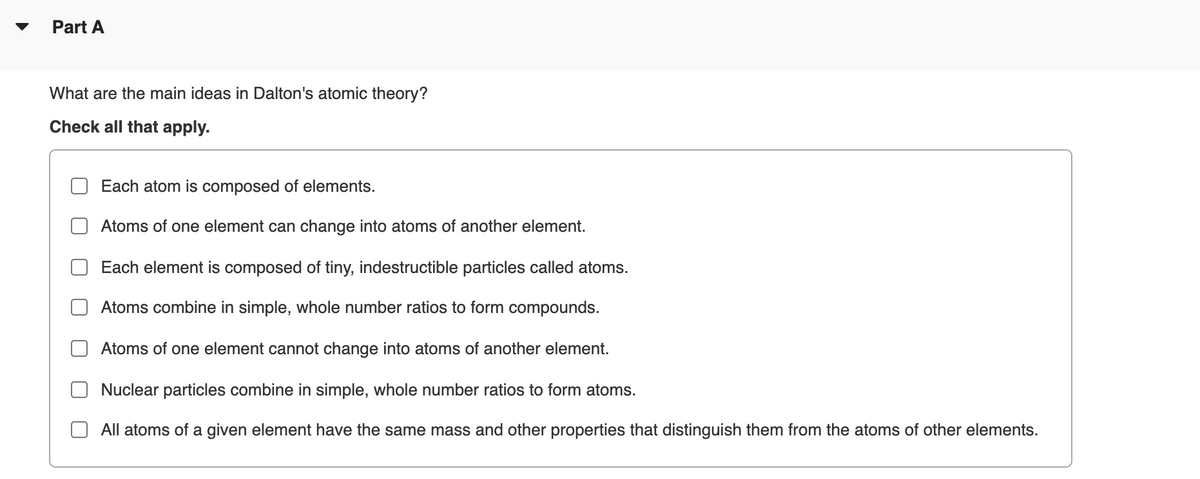What are the main ideas in Dalton's atomic theory? Check all that apply. Each atom is composed of elements. O Atoms of one element can change into atoms of another element. Each element is composed of tiny, indestructible particles called atoms. Atoms combine in simple, whole number ratios to form compounds. Atoms of one element cannot change into atoms of another element. O Nuclear particles combine in simple, whole number ratios to form atoms. O All atoms of a given element have the same mass and other properties that distinguish them from the atoms of other elements. O O O O O O 0
What are the main ideas in Dalton's atomic theory? Check all that apply. Each atom is composed of elements. O Atoms of one element can change into atoms of another element. Each element is composed of tiny, indestructible particles called atoms. Atoms combine in simple, whole number ratios to form compounds. Atoms of one element cannot change into atoms of another element. O Nuclear particles combine in simple, whole number ratios to form atoms. O All atoms of a given element have the same mass and other properties that distinguish them from the atoms of other elements. O O O O O O 0
ChapterU1: Alchemy: Matter, Atomic Structure, And Bonding
Section: Chapter Questions
Problem 3STP
Related questions
Question
Please answer 9 Part A

Transcribed Image Text:Part A
What are the main ideas in Dalton's atomic theory?
Check all that apply.
Each atom is composed of elements.
Atoms of one element can change into atoms of another element.
Each element is composed of tiny, indestructible particles called atoms.
Atoms combine in simple, whole number ratios to form compounds.
Atoms of one element cannot change into atoms of another element.
Nuclear particles combine in simple, whole number ratios to form atoms.
All atoms of a given element have the same mass and other properties that distinguish them from the atoms of other elements.
Expert Solution
This question has been solved!
Explore an expertly crafted, step-by-step solution for a thorough understanding of key concepts.
This is a popular solution!
Trending now
This is a popular solution!
Step by step
Solved in 2 steps with 2 images

Knowledge Booster
Learn more about
Need a deep-dive on the concept behind this application? Look no further. Learn more about this topic, chemistry and related others by exploring similar questions and additional content below.Recommended textbooks for you


Introductory Chemistry: An Active Learning Approa…
Chemistry
ISBN:
9781305079250
Author:
Mark S. Cracolice, Ed Peters
Publisher:
Cengage Learning

Chemistry
Chemistry
ISBN:
9781305957404
Author:
Steven S. Zumdahl, Susan A. Zumdahl, Donald J. DeCoste
Publisher:
Cengage Learning


Introductory Chemistry: An Active Learning Approa…
Chemistry
ISBN:
9781305079250
Author:
Mark S. Cracolice, Ed Peters
Publisher:
Cengage Learning

Chemistry
Chemistry
ISBN:
9781305957404
Author:
Steven S. Zumdahl, Susan A. Zumdahl, Donald J. DeCoste
Publisher:
Cengage Learning


Chemistry: Principles and Reactions
Chemistry
ISBN:
9781305079373
Author:
William L. Masterton, Cecile N. Hurley
Publisher:
Cengage Learning

Living By Chemistry: First Edition Textbook
Chemistry
ISBN:
9781559539418
Author:
Angelica Stacy
Publisher:
MAC HIGHER